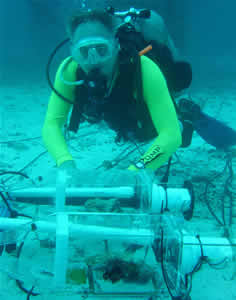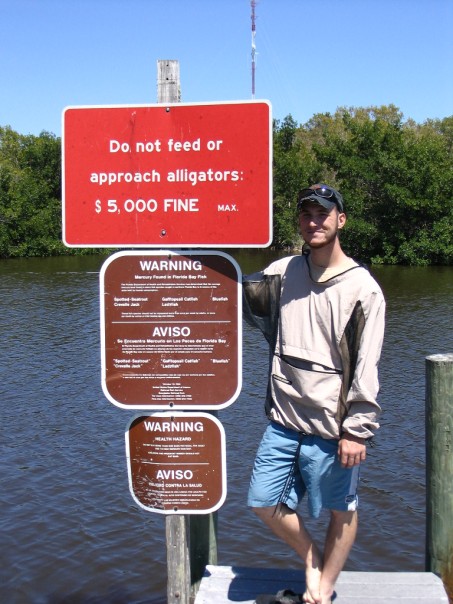
From the underwatertimes, pretty interesting read:




Key Largo, Florida (No v 5, 2007 09:38 EST) Imagine yourself in class on the ocean floor at the world’s only underwater laboratory. A robotic fish named "Fetch" swims by collecting data, while a team of "aquanauts" amazes you with high-tech experiments in coral reef ecology.
v 5, 2007 09:38 EST) Imagine yourself in class on the ocean floor at the world’s only underwater laboratory. A robotic fish named "Fetch" swims by collecting data, while a team of "aquanauts" amazes you with high-tech experiments in coral reef ecology.
The Khaled bin Sultan LIVING OCEANS Foundation is set to kick off a schedule of live broadcasts and webcasts for Project SeaCAMEL (Classroom Aquarius Marine Education Live) from November 12-14. Thousands of students and ocean enthusiasts worldwide will participate in six coral reef classroom sessions transmitted live from the seafloor at the Aquarius Undersea Laboratory, America's "Inner Space Station."
The Aquarius lab is located in the Florida Keys National Marine Sanctuary, is owned by NOAA, and operated by the University of North Carolina, Wilmington.
"As the world's only undersea research station, the Aquarius Reef Base program offers scientists state-of-the-art technology to conduct underwater research and the unique ability to study coral reefs 24/7," explained Dr. Ellen Prager, Aquarius' Chief Scientist. "Project SeaCAMEL offers a tremendous opportunity to bring the excitement, science and marine technology of Aquarius to students and the public through web technology."
During the mission, four aquanauts led by Dr. Mark Patterson of the Virginia Institute of Marine Sciences will descend to the Aquarius habitat to live and conduct experiments. Joining Dr. Patterson will be: Captain Phil Renaud, USN (ret), Executive Director of the LIVING OCEANS Foundation; Dr. Annelise Hagan, LIVING OCEANS' Chief Project Scientist, and D.J. Roller, cinematographer.
"One of the things I like doing as a marine scientist is to invent new tools to measure things in the ocean," Dr. Patterson explained. "Our free-swimming robot "Fetch" will document the corals' ecosphere, and we'll use handheld instruments to measure the health of the reef. Learning more about the reef's problems will hopefully point us toward some solutions."
The Science Modules:
Monday, November 12 (Live Broadcast 2:00 - 3:00 p.m. EST) Living and Working Underwater Program overview; Aquarius Undersea Laboratory and tour of the Habitat.
Monday, November 12 (Live Broadcast 7:00 - 8:00 p.m. EST) The Reef at Night Behavioral changes of reef organisms: corals feeding; large predators; fish sleeping, and fluorescence of corals and other invertebrates under ultraviolet light.
Tuesday, Nov. 13 (Live Broadcast 11:00 a.m. - 12:00 p.m. EST) Reefs Under Siege Coral biology and threats to reefs, including photosynthetic health of corals and the effects of hydrodynamic stress.
Tuesday, 13 Nov. (Live Broadcast 2:00 - 3:00 p.m. EST) Sponges - The Reef's Filters Inject harmless dye into sponges to show and calculate rates of pumping; measure oxygen levels around sponges to calculate metabolic rates.
Wednesday, Nov. 14 (Live Broadcast 11:00 a.m. - 12:00 p.m. EST) Physical Oceanography Conduct boundary layer measurements and oxygen profiles. Does Aquarius induce a local "island mass effect," thereby altering the physical environment of the reef?
Wednesday, Nov. 14, (Live Broadcast 2:00 - 3:00 p.m. EST) Aquarius as an Artificial Reef Surveys of fish populations around the habitat - do fish have a preference for where they shelter? Can Autonomous Underwater Vehicle (AUV) technology be used to quantify fish populations?
For more information on the science modules, visit Project SeaCAMEL's just-launched website: www.seacamel.livingoceansfoundation.org




1 comment:
Hi John!
Very coool site you have! My name is Faye Fontana and I teach a High School Marine Biology class in Las Vegas. Kind of funny teaching Marine Bio in the middle of the desert. Which brings me to my point: Do you use a webcam or have access to Skype? I would love my students to be able to interact with you while you are doing labs, research, or whatever. I think it would be great for them to be able to actually "See" and "experience" the things we are learning about in the classroom. Do you think this would be possible?
I look forward to hearing from you. Faye Fontana
Faith Lutheran High School
Las Vegas, NV
fontanaf@faithluthernlv.org
Post a Comment